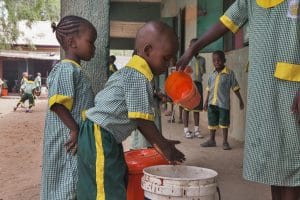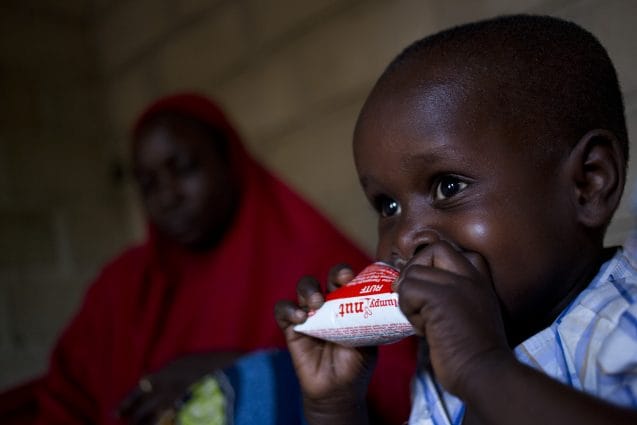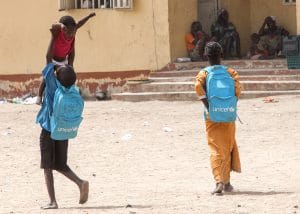Copyright © 2026 UNICEF HUNGARY
Több, mint egymillió gyerek menekül a Boko Haram területéről
2016. szeptember 30. 10:46
Mahamadou Ahmadu egy 17 éves nigériai fiú, aki a 8 éves húgával menekült Diffába, most egy barátja kertjében élnek. Észak-nigériai falujukat a szélsőséges iszlamista szekta, a Boko Haram támadta meg, azzal az indokkal, hogy meg kell büntetni a falu lakóit, mert állítólag a hadseregnek kémkednek.
„Egy keddi napon – épp piac nap volt – csak úgy jöttek és felgyújtották a házat. Megölték az embereket… igazi mészárlás volt. Mindenki futni kezdett, mi 4 órát gyalogoltunk, mielőtt megálltunk volna egy faluban, ahol utána 5 napot maradtunk. Visszajöttünk a dolgainkért, de minden elégett. Minden odaveszett. Úgy döntöttünk, hogy Nigerbe megyünk, ahol van néhány ismerősünk. Az otthoni helyzetre való tekintettel, ez volt a lehető legjobb döntés. Nem tudjuk, hogy miért teszik ezt a Boko Haram emberei… Elrabolták az öcsémet, és fogva tartották, pedig csak TV-t nézett. A szüleimnek mennie kellett tárgyalni. Másnap felégették a falut. Még ezután is minden pénteken vissza kellett mennem Bagába, de mindig féltem. Néhány hónapja történt, hogy körülvettek minket, és fiatal fiúkat kerestek. Egy idős bácsi bújtatott el a ruhái alatt és úgy hagytuk el a falut. Nem szeretek oda visszamenni, félek. Apa még mindig ott van, nagyon féltem őt is. Ott már nem maradt semmi, úgy mondanám, hogy Nigériának vége. Itt kedvesen fogadtak emberek, segítettek alapdolgokat megvenni, és tudják, hogy min mentünk keresztül… A fiatalok sem ellenségesek. Az álmom? Hogy olyan helyen éljek, ahol béke van és el tudom tartani magamat és a családomat.” – mesélte az UNICEF munkatársának Mahamadou.
2013-ban a kormány erők és a fegyveres csoportok közötti konfliktus eszkalálódni kezdett. A visszaélésektől, szexuális erőszaktól, erőszakos toborzástól, vagy haláltól való félelem arra kényszerítette a gyerekeket, hogy elhagyják lakóhelyüket, legtöbbször csak egy hátizsáknyi ruhával. Csak Észak-Nigériában körülbelül 20.000 gyerek él a családjától elválasztva. A konfliktus kezdete óta több ezer gyereket – fiút és lányt – toboroztak erőszakkal a fegyveres csoportok, és használták őket támadások végrehajtására. 2014 óta 86 gyereket kényszerítettek öngyilkos merényletre Nigériában, Kamerunban, Csádban és Nigerben.

Az afrikai Csád-tó medencéjében az erőszak és a pusztítás óriási népvándorlási hullámot indított el. Gyerekek százezrei vannak a front vonalak mögött. A helyi közösségek mindent megtesznek, amit tudnak, pedig ők maguk is a világ legszegényebbjei közé tartoznak. Menedéket nyújtanak annak a 2,6 millió embernek – közülük 1,4 millió gyereknek -, akiknek el kellett hagyniuk az otthonukat. Észak-kelet Nigériában Maiduguri város összlakossága 1.000.000 fő, de már 700.000 menedék kérőt fogadtak be. A bizonytalanság és a zuhanó olajár súlyos károkat okozott a mezőgazdaságban. A földek nincsenek megművelve, az állatállományt gyakran ellopja a Boko Haram, vagy csak hátrahagyják. Körülbelül 3,8 millió ember érintett az élelmiszerválságban a környéken.
3 éve tart a humanitárius katasztrófa, de ez krízis még mindig alulfinanszírozott, a családok, gyerekek szükségletei pedig nőnek. Az UNICEF partnereivel együtt kihívásokkal teli környezetben dolgozik, de mindent megtesz, hogy jobb körülményeket biztosítson az itt élő embereknek a bizonytalanság és finanszírozási problémák ellenére.

Amit eddig elértünk Észak-Nigériában:
168.000 gyerek kapott pszichoszociális segítséget a gyermekvédelmi programon keresztül
96.000 súlyosan alultáplált 5 év alatti gyereknek biztosítottuk a szükséges élelmet
2.000.000 ember részesült az elsődleges egészségügyi ellátásban
444.000 ember jutott tiszta vízhez
132.000 ember higiéniai ellátása javult
109.000 gyerek kerüt be iskolai vagy egyéb tanulmányi programban

Kapcsolódó híreink
Copyright © 2026 UNICEF HUNGARY